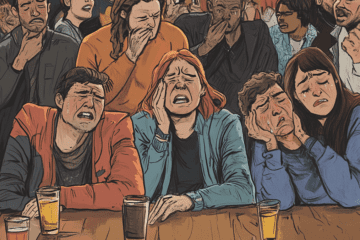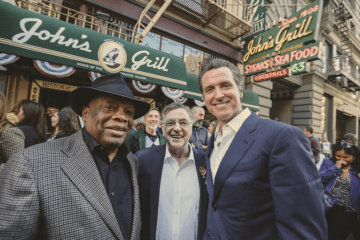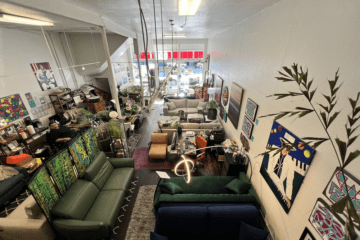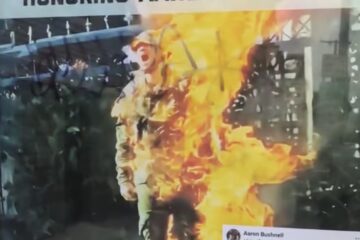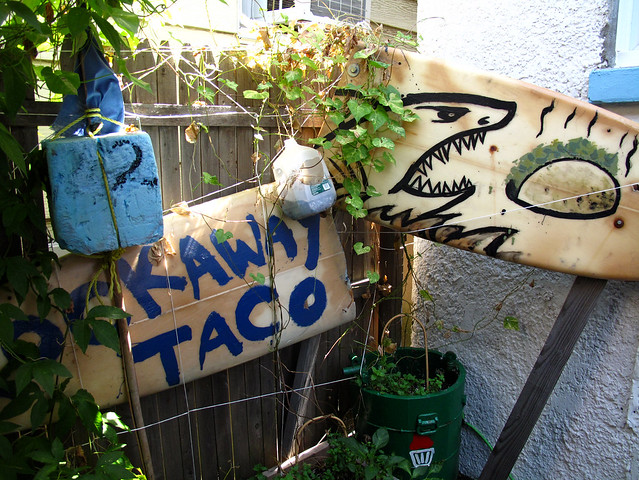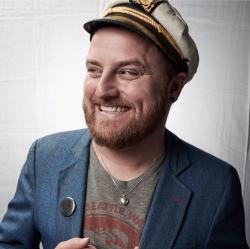Broke-Ass Band Interview: The Devil Makes Three

From the left: Pete Bernhard, Lucia Turino, and Cooper McBean. Cooper McBean might be the best name ever.
As I’ve mentioned before I first met The Devil Makes Three many years ago when I lived above a coffee shop in Santa Cruz named Caffe Pergolesi. The three of them worked downstairs at the cafe, so I got to see them perform a lot at the start of their careers. Now they are blowing the fuck up. They sold out two nights in a row at the Independent in San Francisco not long ago and they just played Outside Lands. While they were in town, I caught up with them for a couple beers and we rapped for awhile about Santa Cruz, babies, music and Caffe Pergolesi. They also had some really insightful advice about surviving financially on tour (attn: broke musicians!). The interview is a bit long, but it’s pretty entertaining, and you’ll probably learn a thing or two…if you’re into that sort of thing.
The lead singer, Pete Bernhard has a new album out. Check out, Straight Line, it kicks ass.
Broke-Ass Stuart: Alright, so um, hi guys.
Devil Makes Three: Hi Stuart
BAS: You guys have gotten pretty big at this point but I always tell the story that, when I used to live above Pergolesi, you all worked downstairs at the coffee shop and people were like, 'œyeah the people downstairs have a band' and I was like, 'œI don’t fucking care'
DM3: (laughing)
BAS: ''œeverybody’s got a fucking band' and I went downstairs to buy one of those green Hanson’s energy drinks, I don’t think exist any more, they were fucking good, and I heard you guys playing Old Number 7 and I was like, 'œwhat the fuck? They’re actually good' and so here’s my question: were your first shows art Pergolesi?
Pete Bernhard: We played most of our first shows at houses. We played at Rigg Street and we played on Kennan Street and we played at that house on the corner of'
Lucia Turino: Laurel St.
PB: Laurel St'.
LT: But Pergolesi was one of the first ones.
PB: Pergolesi was one of the first ones in a venue.
LT: If you can call it a venue (everyone laughs)
PB: Yeah, bands still play there. It was a place where bands play. You know? So, it was our first show in a place where bands play.
BAS: And I remember I did see one house party where you guys actually had a drummer.
PB: Yeah, Boaz.
BAS: How long did that last and when did you stop working with him?
Cooper McBean: He decided to have a kid.
BAS: These things happen.
CM: Yes they do.
PB: Six months I’d say.
LT: November to May and we were going on tour and he had just gotten pregnant. He wanted to come but it wasn’t his choice. We made the choice for him. He was also a science student and planning to go to grad school and a kid on the way, so we were like 'œdude you’re fucked.' (laughter). It was like, 'œwe know you want to but it’s not gonna work out.' And then once he had the kid he realized it definitely wasn’t gonna work out.
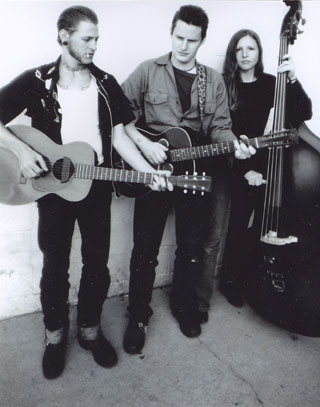
This is what The Devil Makes Three look like when they're pretending to play music.
BAS: Yeah, they’re fucking vortexes of everything. Thank god I don’t have any kids.
LT: But yeah that was Boaz, he’s still in Santa Cruz.
BAS: So you guys are not in Santa Cruz any more right?
DM3: No
BAS: You’re all in Davis?
DM3: Yup.
BAS: Now what precipitated that? Like how did you guys end up in Davis?
PB: Lucia went to school in Davis
LT: Santa Cruz is expensive.
PB: Yeah we didn’t want to leave Santa Cruz but it was expensive. We split town long ago now.
LT: Pete an I left 4'5 years ago'it was 2005, so 5 years ago. It was one of those things where we were just getting to the point where we were starting to make it as just musicians. But rents in Santa Cruz were sorta killing us.
PB: We were doing it there, but we were just barley doing it'
LT: Yeah, cus we were living in a box (laughs)
PB: Cooper lived at Rigg Street'
LT: We lived in a one room cabin in Bonny Doon
BAS: And even that was expensive?
LT: It was $400 for a 10×12 foot cabin. It was the size of this room (one of the green rooms at the Independent). So it was one of those things where we could move somewhere else and pay the same amount of rent and actually have space and be comfortable. When you’re coming home from the road, you wanna be able to go some place where you can chill out and be comfy.
BAS: So now you guys are surviving as musicians.
PB: Yeah we are and we have been for awhile now.
BAS: That’s amazing! I’m still at the point where I’m trying to survive off my shit. That’s dope! Good for you guys! So what’s the last job you had before you were full time musicians? Were you Java Jockeys still?
PB: Yeah we did that. We all did different things. I was doing landscaping I think was the last job. I also worked on a farm with Lucia.
LT: Remember Shauna
BAS: Shauna sounds familiar'
LT: She was Cooper’s girlfriend for awhile. She worked on a horse farm. You’d probably recognize her from around the Perg. She was working on a horse farm and so after I quit the Perg I was working out there and they were cool because they let me come and go as I wanted to with tour and so it just got to the point where I was working less and less and touring more and more. And then we were in this weird spot where we were just like, 'œWe’re just doing this and there is no other money coming and it’s really scary.'
PB: It was the perfect transitional job to have and she was really supportive of us and eventually it just got ridiculous and we had to quit. But it was cool. It worked well for awhile.
BAS: Pete, I’m gonna segue into your stuff. Is this your first solo album?
PB: Well I did one other one but I didn’t really but I didn’t really put it out that much. I did a thousand copies and then I never repressed it.
BAS: Did you put it out yourself.
PB: Yup, put it out myself and I went on like one tour for it. Then I did this record. So yeah, in a sense and also because it’s my the first record on a label. It’s on the sam record label that the Devil Makes Three is on.
BAS: A difference I’ve noticed is that it’s a lot bigger of a sound.
PB: Yeah, well there’s drums and that makes a huge difference. And there’s a B3 organ, that’s awesome. It’s one of my favorite parts. But I don’t play that. There’s organ, bass, electric guitar, singing, you know, regular lead vocal and back-up vocal.
BAS: How do you decide which songs you’re gonna take to The Devil Makes Three and which ones you’re gonna do on your own?
PB: Well, all those songs sound better with drums.
BAS: Gotcha. And do you all do the songwriting for the Devil Makes Three together at this point?
PB: Not really.
BAS: Cooper, do you write the ones you sing?
CM: Yeah, I write the songs I sing, Pete writes the ones he sings.
LT: Some of the songs and music are more collaborative and some of the songs Pete or Cooper will come in and be like, 'œThis is the song I wrote' and then we’ll do a little shifting around. Like some of the songs on the new album were just musical ideas that we came up with, usually as a band, years ago, some even while I was living at Rigg St. so that’s like six years ago, and then nothing ever happened with it and then Pete finally put words to them. So Pete does most of the lyric writing and some of the music is collaborative.
BAS: I know that Do Wrong Right is out now, Pete, is Straight Line out for consumption yet?
PB: Yeah it is. I went on tour for it in September, so it’s been out for a little while now. And I’m gonna go on tour for it again in February.
BAS: You doing both coasts or just this one?
PB: Just the West Coast. I’m doing from San Diego to Seattle.
BAS: So then is the Devil Makes Three’s fan base bigger on the West Coast?
PB: Oh yeah, much. It’s the biggest from San Diego to Seattle in fact (laughs).
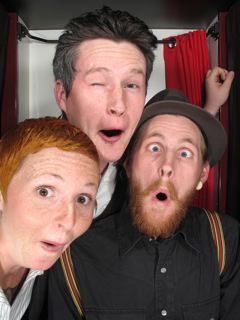
Long periods of time on the road will do this to you.
BAS: You’re playing big venues out here, so does that mean that when you go out to Brooklyn you’re playing warehouse parties?
PB: No we play clubs in Brooklyn. We played the Southpaw last summer there. Right before that we did Public Assembly. We do the Middle East in Boston. It’s getting there. We’re doing pretty good there, we’re doing pretty good in the Midwest. It’s coming in the rest of the country for sure. Our shows are good, our tours are really fun. But we’re WAY bigger here than we are out there.
BAS: Because you’re based out here?
PB: We’ve just spent so much more time out here. We’ve been doing like Texas into Montana, you know that circle, for the past seven years, but we’ve only just really started in the past two or thee to go to the East and tour up and down the coast.
BAS: I feel you on that. I’ve got two books now, one for San Francisco and one for New York, and the San Francisco book is WAY bigger than the New York one just because I’ve been based on the West Coast for so fucking long.
PB: Yeah, and New York is just s different and harder city. I think we’re coming along in New York. Our last show there was really great and our next one will be really good.
LT: You know you really just got to keep plugging. It’s the same thing we did here. We started playing house shows in Santa Cruz, and the first time we went on tour in the West Coast, no one came (everyone laughs). No one came! But we just kept doing it and eventually people started catching on.
PB: We’re already doing way better than that on the East Coast. People are definitely coming out. All the work that we’ve done out here has really effected the East Coast to the point where we don’t have to do that work now. The wave, or like, the echo of what we’ve done has reached there even though we really haven’t played there that much so our shows there are already doing really well.
LT: When we started here, we were lucky to get five people to come out who didn’t actually know us personally and we’ve been going to East Coast cities and we can get 50 people who don’t personally know us.
PB: And these are places we’ve never played before, like the first time we went to New Orleans we had 200 people or more and we’d never been there before.
BAS: I could see them digging you in New Orleans for sure.
PB: Yeah, it was great. That place is great. It’s one of my favorite places to play and some of our best shows on tour happen there. Ashville, North Carolina is also really good.
LT: Yeah, we got there and all these people showed up. We’ve had a lot of friends who lived there, but we’d never played there before. And we show up and we’re like, 'œif we get 50 people we’re gonna be stoked' and then there’s like 150 and we’re like 'œWOW!'.
BAS: That’s amazing. That’s gotta feel great. Now, for bands that are up and coming, do you have any tips for how to save money?
LT: Go and read Danny Barnes website. It’s all about if you’re in a band and you wanna make a go of it, what you need to do.
PB: Do you know who Danny Barnes is?
BAS: No.
PB: He basically said: you keep your expenses really low, you live in a box, and you are really careful with your money. You know, you are broke. And you focus on doing your music or your art and you don’t get your expectations too high. From our experience too, you play around where you live. If you aren’t doing well there, you can’t got anywhere else. A lot of bands will try to take the show on the road when really nobody likes them where they live. That’s an important step. We started by going out in really small circles. We played Santa Cruz forever and nobody really came and then people started to come and the new finally started to get up to San Francisco and people didn’t really like us there, but we played there for years. And then we finally went out on tour and when we went out on our first tour, like Lucia said, nobody really paid attention, but we did it again and again and again. So it’s a slow process and keep your expenses low is so important. Like we had so many friends who did their record who dumped a whole bunch of money into it thinking 'œthat gonna be the thing', when that’s not really the thing. It’s like dumping a bunch of money into is not the way to do it. Living with no money is the way to do it.
LT: And being able to build your audience at home so that you can actually make a little bit of money there to help fund going out on tour.
CM: It’s your fan base. You build that up first so you can fall back on that. You make your money at home so you can go out and do these totally money sapping adventures out into the rest of the world and come back and be able to pay your rent.
LT: It’s why we didn’t go to the East Coast for so long. Now on the West Coast we do well'
PB: So we can go to the East Coast and lose money.
LT: (cracks up)
PB: That’s what we do, we go to the East Coast and lose money. But we wanna go to the East Coast because we’ve got fans out there and we wanna play there and we really wanna build there. So we do what we do out here, we have great shows out here, and we go out there and play small shows and we have a lot of fun. So one sorta funds the other and it’s like we’re still doing that same thing we’ve been doing all along.
LT: Your first tour should not be national. It should be small.
PB: We actually met some musicians when we were on tour in Montana and they were like, 'œWe’re going on this national tour, do you have any advice for us?' and I was like, 'œYou know what? Don’t go on it' (everyone laughs). I mean, do go on a national tour if you wanna have fun and go on an adventure, I mean I don’t want to dissuade anyone from doing that because it’s a blast. But they were wanting to make it. They wanted a record deal and all this stuff. They were really bummed when I said that.
LT: He’s all 'œWe got this beat ass RV, we don’t have the tour fully booked yet and we’re leaving for three months.'
PB: But it turned out though that they did really want to be on an adventure'
BAS: Yeah, and now their called The Strokes and they did pretty well (everyone laughs).
PB: I think they probably had a blast
LT: They were up for an adventure
PB: Yeah, and that’s great. I would never say any band shouldn’t go on a national tour if that’s what they wanna do. But we didn’t do it and we mainly didn’t do it because we couldn’t afford it.
LT: Yeah, if you’re gonna do that, you better save a lot of money. Don’t plan on making any. And the further you travel, the less money you make.



